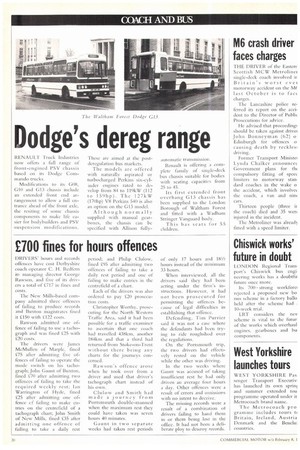£700 fines for hours offences
Page 20

If you've noticed an error in this article please click here to report it so we can fix it.
DR[VERS' hours and records of fences have cost Derbyshire coach operator C. H. Redfern its managing director George Rawson, and five of its drivers a total of £717 in fines and Costs.
The New Mills-based company admitted three offences of failing to produce records and Buxton magistrates fined it £150 with £122 costs.
Rawson admitted one offiNace of failing to use a tachograph and was fined £25 with £20 costs.
The drivers were James McMullen of Marple, fined £75 after admitting five offences of failing to operate the mode switch on his tachograph; John Gaunt of Buxton, fined £70 after admitting two offences of failing to take the required weekly rest; Ian Warrington of Hyde, fined £25 after admitting one offence ci failing to make entries on the centrefield of a tachograph chart; John Smith of New Mills, fined £35 after admitting one offence of failing to take a daily rest
period; and Philip Cluiow, fined £95 after admitting two offences of failing to take a daily rest period and one of failing to make entries in the centre field of a chart.
Each of the drivers was also ordered to pay £20 prosecution costs.
Christopher Worthy, prosecuting for the North Western Traffic Area, said it had been possible for a traffic examiner to ascertain that one coach had travelled 438km, another 184km and that a third had returned from Stoke-on-Trent without there being any charts for the journeys concerned.
Rawson's offence arose when he took over from a driver and used that driver's tachograph chart instead of his own.
Clulow and Smith had made a journey from Portsmouth double-manned when the maximum rest they could have taken was seven hours 40 minutes.
Gaunt in two separate weeks had taken rest periods of only 17 hours and 181/2 hours instead of the minimum 33 hours.
When interviewed, all the drivers said they had been acting under the firm's instructions. However, it had not been prosecuted for permitting the offences because of legal difficulties in establishing that offence.
Defending, Tim Purrier said it was not a case where the defendants had been trying to ride roughshod over the regulations.
On the Portsmouth trip, the two drivers had effectively rested on the vehicle while the other was driving.
In the two weeks where Gaunt was accused of taking insufficient rest he had only driven an average four hours :I day. Other offences were a result of errors and omissions with no intent to deceive.
The missing records were a result of a combination of drivers failing to hand thesis in or them being lost in the office. It had not been a deliberate ploy to destroy records.




























































